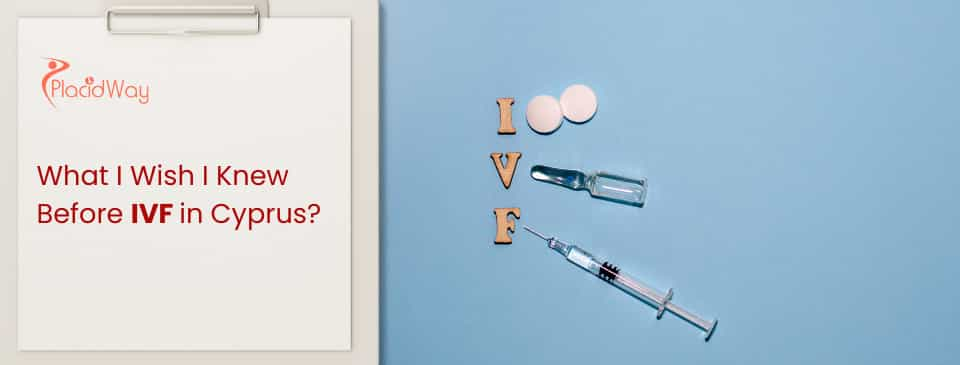Why Choose Cyprus for IVF?

Considering In Vitro Fertilization (IVF) to help grow your family? For many, the journey to parenthood can be a challenging one, and seeking treatment abroad has become a popular and often successful option. When it comes to fertility treatments, Cyprus has emerged as a leading destination for international patients. Its high success rates, more relaxed regulations, and relatively lower costs make it an attractive choice.
However, making the decision to travel for something as significant as IVF in Cyprus requires careful thought and thorough preparation. This guide is designed to give you all the information you wish you knew ahead of time, from understanding the legal landscape to preparing for your stay and managing your expectations. By the end of this, you will have a clear and comprehensive understanding of the process, helping you make a confident and well-informed choice.
The key to a successful experience with IVF in Cyprus is being well-informed. While the clinics are modern and the doctors are highly skilled, the process is different from receiving care in your home country. Understanding the full timeline, the costs involved, and the necessary pre-travel preparations will ensure your focus remains on the treatment and your well-being.
What are the main advantages of choosing IVF in Cyprus?
Many couples and individuals choose Cyprus for their fertility journey due to a combination of factors that make the process more accessible and appealing.
- High Success Rates: Many clinics in Cyprus report impressive success rates, often higher than the international average. This is attributed to experienced doctors, advanced lab technology, and personalized treatment plans.
- Cost-Effectiveness: The cost of an IVF cycle in Cyprus is significantly lower than in many Western countries. This makes it a viable option for those who cannot afford the high prices at home or for whom multiple cycles are needed.
- Favorable Legislation: The legal framework in Cyprus is less restrictive, which allows for treatments that may be prohibited elsewhere. This includes egg donation and embryo donation, as well as pre-implantation genetic diagnosis (PGD) for gender selection.
- No Waiting Lists: A major benefit of IVF in Cyprus is the large, diverse pool of anonymous donors, which means there are typically no waiting lists for egg or sperm donation. This can significantly speed up the treatment process.
These benefits, combined with the island's pleasant climate and beautiful scenery, allow many patients to feel more relaxed and less stressed during their treatment, which can be beneficial for the outcome.
What is the cost of IVF treatment in Cyprus?
While the cost of IVF in Cyprus is a significant advantage, it's important to understand the full financial picture. The prices quoted by clinics are often for the base treatment cycle, and additional costs can add up.
Here’s a breakdown of potential costs to consider:
- Base IVF Cycle: This usually includes the doctor’s fee, lab work for egg retrieval and fertilization, and the embryo transfer.
- Medication: The cost of fertility drugs is often not included and can vary widely depending on the patient's protocol. This can add several hundred to a thousand Euros to the total cost.
- Additional Procedures: If you need services like ICSI (Intracytoplasmic Sperm Injection), assisted hatching, or genetic testing (PGT), these will be extra.
- Travel and Accommodation: You will need to stay in Cyprus for a minimum of 7-10 days for the on-site part of the treatment. You must budget for flights, hotels, and daily expenses.
Always ask for a detailed, itemized quote from your clinic. Some clinics offer all-inclusive packages that simplify budgeting and may include airport transfers and accommodation assistance.
What are the IVF success rates in Cyprus?
Success rates are a key factor in choosing a clinic. While many clinics in Cyprus publish their own rates, it's important to understand what those numbers mean. A clinic's success rate is influenced by many factors, including patient age, cause of infertility, and the specific treatment protocols used.
Success rates are often higher for:
- Younger Patients: The quality of eggs decreases with age, so women under 35 typically have the highest success rates.
- Egg Donation: Using donor eggs from young, healthy women significantly boosts success rates, with some clinics reporting rates of over 70%.
- Embryo Donation: This also has very high success rates because both the egg and sperm are from young, healthy donors.
When you ask a clinic about their success rates, make sure to ask for the data broken down by age and treatment type. This will give you a more accurate picture of your own chances of success.
What should I do to prepare for my IVF trip to Cyprus?
The journey to IVF in Cyprus begins long before you get on the plane. Proper preparation is essential for a smooth and stress-free experience.
- Pre-Travel Medical Tests: Most clinics will require you to complete a series of tests in your home country and send them the results. This typically includes hormone blood tests (AMH, FSH, LH), a transvaginal ultrasound, and infectious disease screening (HIV, Hepatitis). This saves time and money.
- Coordinate Your Cycle: Your clinic will provide a personalized treatment calendar. You will often begin hormonal stimulation medications in your home country, a week or two before you travel.
- Plan for Your Stay: You should plan to stay for at least 7-10 days, depending on your treatment plan. This allows time for monitoring appointments, egg retrieval, and embryo transfer. Your patient coordinator can assist with hotel bookings and transportation.
- Emotional and Logistical Support: It is highly recommended to travel with a companion. Having a support person can make the process less stressful and help with simple tasks while you are resting.
How long do I need to stay in Cyprus for IVF treatment?
The length of your stay depends on the specific treatment protocol.
- Full IVF Cycle (with own eggs): This is the longest stay, usually around 10-12 days. You will arrive for monitoring, undergo egg retrieval, wait for fertilization and embryo development, and then have the embryo transfer.
- Egg Donation or Embryo Donation: These treatments require a shorter stay, often just 5-7 days. This is because the donor part of the cycle is managed by the clinic, and you only need to be present for the embryo transfer and a final check-up.
Your clinic will provide a detailed calendar so you can book your flights and accommodation with confidence. They will guide you through the process step-by-step.
What should I expect during my IVF treatment in Cyprus?
The on-site part of the IVF in Cyprus process is a focused and coordinated effort.
- Initial Consultation: Upon arrival, you will have an in-person consultation with the doctor to review your test results and treatment plan.
- Ovarian Stimulation and Monitoring: For about 7-10 days, you will take hormone injections to stimulate your ovaries. You will visit the clinic for daily or every-other-day ultrasounds and blood tests to monitor the development of your follicles.
- Egg Retrieval: This is a minor surgical procedure performed under light sedation. A fertility specialist uses an ultrasound-guided needle to retrieve the eggs from your ovaries.
- Fertilization and Embryo Development: The retrieved eggs are fertilized with sperm in the lab. The resulting embryos are monitored for 3 to 5 days.
- Embryo Transfer: The best-quality embryo(s) are transferred to your uterus using a small catheter. This procedure is generally painless and does not require sedation.
After the transfer, you will receive instructions for post-treatment care and medication. The final pregnancy test is done about 10-14 days later, usually after you have returned home.
PlacidWay specializes in connecting you with top-rated clinics and medical centers for fertility treatment abroad. Explore our extensive network of verified healthcare providers to find a safe and reliable solution for your journey to parenthood.


.png)
.png)
.png)



Share this listing